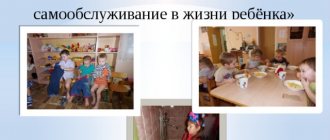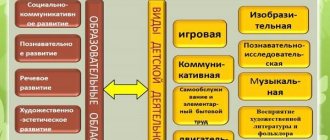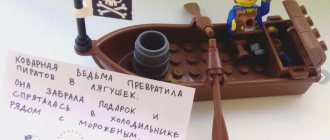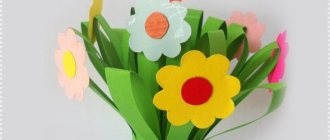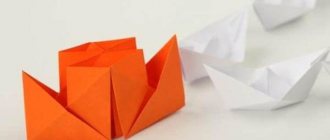Development of labor activity in preschool age
While performing a work task, children often switched to play; it is the closeness of work to play that is another feature of children’s work activity. Therefore, when working with children, I often use group games-activities and games-exercises. I tried to establish a close relationship between the play and work activities of children. Thus, cleaning the group room together was turned into a game-activity. For example, the game-activity “Household Service”, the purpose of which is to teach children to participate in the organized work of a group of peers; be able to relate your activities to the work of others and understand that the work of the subgroup in which you work is part of the overall cause of the team; develop relationship skills, the habit of cleanliness and order; consolidate the ability to plan activities and distribute responsibilities among themselves; be able to evaluate the activities of your team and the team as a whole; teach to love physical work, to experience a feeling of satisfaction from participation in it, from the physical activity with which it is associated, from the positive result of the activity; create a healthy spirit of competition between groups; to form in children a belief in the social significance and necessity of household work. If the work took place outside, for example, when cleaning the area (from leaves, snow), she also introduced elements of the game. I suggested dividing into two teams, choosing foremen and distributing responsibilities. The deputies used objects, a truck is a box tied with a string, and a bulldozer is a rake, this does not bother anyone, dump trucks hum, bulldozers rumble. We support this playful mood by brightening up individual failures or grievances with a cheerful joke, a well-chosen proverb or poem:
“I took a broom, swept the whole area, the broom poked its nose everywhere, I followed it, did not lag behind. We invite you, come and find even a speck of dust!”
(Internet resource)
While washing toys and washing doll clothes, we carry out physical exercises. Wait a minute
"Wash"
(Imitation of movements).
We wash, wash, wash all day long. Look, arms, legs, are they tired? Are you ready to go to work again, or should you go? We rinse, rinse, rinse all day long. Look, arms, legs, are they tired? Are you ready to go back to work? We push, push, push all day long. Look, arms, legs, are they tired? Are you ready to go back to work? We hang, we hang, we hang all day long Look, your arms, your legs, are they tired? Are you ready to go back to work?
Children love to play role-playing games. For example: “Laundry”, “Dry cleaning”, “Canteen”, “Hospital”, “Emergency service”, “Fire service”, etc. During the games, it turned out that the children did not have some attributes for games. And since they love these games, they decided to make the attributes themselves. They began to think about what could be made from what. We discussed everything amicably and got to work. For example, we made candies from plasticine and candy wrappers for the role-playing game “Shop.” After this, the children themselves united more than once to make attributes of their games. Children are very interested in making toys. In their free time, they willingly, on their own initiative, make various crafts, often making them as gifts for their parents. With great interest and desire they make collective crafts (toys) to decorate a group room for the holidays.
Preschool pedagogy
GOU SPO (SSUZ) "Chelyabinsk State Pedagogical College No. 2»Preschool pedagogyTest tasks for intermediate certification of students
Compiled by: Pronyaeva S.V.,
teacher of preschool pedagogy
2008 Introduction
In modern conditions of development of Russian society, it is believed that one of the important trends in reforming the educational system was the introduction of a state educational standard.
The state educational standard is designed to solve a wide range of problems, such as ensuring a high level of professional education and quality of training of specialists; ensuring academic freedom of the educational institution in the formation of flexible and variable content of education and organization of the educational process; ensuring the unity of the content of education and compliance with the norms and requirements for the organization of the educational process throughout the educational space of Russia; ensuring control over the effectiveness of the software system and the quality of education in it.
Education cannot be complete without regular and objective information about the degree to which students have mastered the educational material and their practical application of knowledge. The need to monitor learning and evaluate knowledge is dictated by the mandatory implementation of the following chain: learning goal - learning process - result - new goal. The most important component of educational technology is the test as a tool for measuring the level of knowledge, without which it is impossible to identify the fulfillment of the standard, but also to optimally manage the educational process, without which it is impossible to achieve high-quality mastery of the standard.
The course of preschool pedagogy is one of the leading ones in the professional education of teachers; its study takes a fairly large amount of time, which requires various types and forms of control. Test control is not the only form of control; in the presented version it claims to assess knowledge along the content lines of the educational program and does not affect the practical skills of students.
These materials can be certified on the following grounds: Name of academic discipline
: preschool pedagogy
Name of educational program
: Preschool pedagogy, 2005
Purposes of creation
: intermediate certification
Number of tasks
: 15
Number of options
: 3, 4
Completion time
: 30 minutes
Type and form of tests
: closed, with multiple choice
Score
: 100% - 80% - assessment "5"
81-70% – score “4”
71-60% – score “3”
“5” - the student knows the program material, understands and has thoroughly mastered it, gives correct, conscious and confident answers to questions
“4” - the student knows the program material, understands it well, makes minor mistakes
“3” - the student discovers knowledge of the basic program material, experiences some difficulties, overcomes them with the help of the teacher
“2” - the student reveals ignorance of most of the program material, answers uncertainly, makes gross mistakes. Instructions for use
: 1. Read the question carefully, paying attention to the construction of the question.
2. Indicate the number of the question and possible answers to it 3. If you wish, you can first answer questions the answers to which do not cause you any difficulties, and then answer more complex questions Test on preschool pedagogy for the topic “Upbringing is the leading function of preschool pedagogy”
1 Raising
preschool children is
:
a) the process of introducing universal human values to the world
b) the process of formation of moral values
c) the process of interaction between an adult and a child aimed at developing the child’s personal qualities in accordance with universal human values
2.
From the proposed groups of value relations, select the one that represents universal value relations
:
a) Attitude towards family, attitude towards oneself, attitude towards the Fatherland, attitude towards culture, attitude towards art, attitude towards religion
b) attitude to national culture, attitude to material culture, attitude to the historical events of one’s country, attitude to national heroes, attitude to the traditions of one’s family
c) attitudes to national holidays, attitudes to one’s own birthday, attitude to genealogy, attitude to Orthodoxy, attitude to Russian culture
3.
From a number of proposed definitions, choose the one that, in your opinion, most fully reveals the essence of the process of moral education:
a) Moral education is the influence of the educator on the student in order to form his moral qualities as a person.
b) Moral education is a pedagogical process aimed at promoting the development of moral qualities of an individual based on the assimilation of universal and national moral values
c) Moral education - organized interaction between the teacher and the students, aimed at the formation of consciousness, feelings and relationships
4.
Indicate researchers of problems of moral education of preschool children
:
a) Vinogradova A.M.
b) Zaporozhets A.V.
c) Nikolaeva S.N.
d) Nechaeva V.G. 5. Select educational methods aimed at developing moral consciousness:
a) ethical conversation
b) a story on an ethical topic
c) encouragement
d) reading fiction 6. Identify methods that are not used in raising children:
a) suggestion
b) physical punishment
c) accustoming to the rules of social behavior
137.5 Kb.
Share with your friends:

